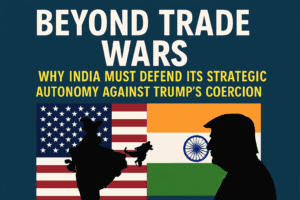Beyond Trade Wars: Why India Must Defend Its Strategic Autonomy Against Trump’s Coercion
Shyam Saran asserts that India must resolutely defend its strategic autonomy against President Trump’s coercive tactics, which weaponize trade to dictate India’s foreign policy choices – notably its ties with Russia, Iran, and BRICS+. This transcends a mere trade dispute; it poses an existential threat to India’s sovereign decision-making and hard-earned international credibility built on independent action.
Trump’s glaring inconsistency – aggressively targeting India while avoiding confrontation with a defiant China that leverages its own economic countermeasures – starkly reveals that capitulation invites escalating demands. India must therefore reject appeasement, recognizing that short-term economic pain (estimated at ~2% GDP impact) is a necessary price to prevent the far greater, permanent cost of surrendering sovereignty and setting a precedent for endless coercion.
Protecting vital defense and tech cooperation remains crucial, but India should draw strength from its history of principled defiance (like rejecting the discriminatory NPT and CTBT) and its respected global standing, particularly among developing nations. The upcoming Quad summit serves as a critical test; potential U.S. withdrawal would force a fundamental reassessment of the alliance and underscore the high stakes of standing firm.

Beyond Trade Wars: Why India Must Defend Its Strategic Autonomy Against Trump’s Coercion
Shyam Saran’s stark warning cuts through the diplomatic niceties: The Trump administration’s actions represent an existential threat to India’s core foreign policy principle – strategic autonomy. This isn’t merely a tariff spat over steel or aluminum; it’s a calculated campaign using economic weapons to force geopolitical submission. Trump’s targeting of India’s relationships with Russia, Iran, and its BRICS+ membership signals a dangerous shift where Washington demands unilateral control over its partners’ alliances.
The China Contrast: A Lesson in Power Dynamics
Saran highlights the glaring inconsistency in Trump’s approach. While India faces penalties, China – engaging in similar activities like purchasing Russian oil and trading with Iran – escapes unscathed. Why? Beijing’s refusal to be bullied is key. China countered Trump’s threats with its own leverage (rare earth metals), demonstrating that bullies respect strength, not appeasement. China, despite greater exposure to US markets, absorbed potential pain to avoid the far greater long-term cost of capitulation. India, with significantly less trade dependence on the US (roughly 10% of total external trade), possesses more room to maneuver than it often acknowledges.
India’s Imperative: Resisting the Bully’s Playbook
Saran outlines a clear, principled strategy for India:
- Recognize the Adversarial Shift: Wishful thinking is futile. Trump views relations transactionally and coercively. India must accept this new, confrontational reality and prepare accordingly.
- Protect the Strategic Core: Vital cooperation in defense, intelligence, and high-tech remains crucial. These areas should be insulated from the broader economic conflict as much as possible – they are assets for both nations.
- Reject Capitulation: Appeasing Trump (“Realist School” advice) is a dangerous illusion. Bullies interpret submission as weakness, inviting escalating demands. Short-term economic pain (estimated at a 2% GDP growth reduction) is preferable to the permanent erosion of sovereignty and the endless cycle of concessions capitulation would entail.
- Leverage Historical Resolve & Global Standing: India’s past demonstrates its capacity for principled defiance – refusing the discriminatory NPT in 1968 and CTBT in 1995. This legacy earned global respect, particularly among developing nations who still look to India. Sacrificing tangible interests for the symbolic “high table” is a false bargain. India’s true diplomatic ballast lies in its independence and credibility, not proximity to power.
The Looming Test: The Quad Summit
The upcoming Quad summit, potentially featuring Trump, becomes a critical litmus test. If the US withdraws or uses it as leverage, it fundamentally challenges assumptions about the Quad’s stability and the US commitment to the Indo-Pacific as a partnership of equals. India must be prepared for this possibility, aware that other Quad members are also reassessing.
The Unavoidable Choice
Saran’s conclusion is unequivocal: India faces a defining moment. While resistance under Trump will bring economic costs and friction, the alternative – surrendering control over its foreign policy and strategic partnerships – inflicts a far deeper, lasting wound on national interest and dignity. India’s strength has always resided in its independent agency. Preserving that autonomy, even against a superpower’s pressure, is not just an option; it’s a necessity rooted in seven decades of hard-won sovereignty. The Indian people have historically supported sacrifices for core national interests; this challenge demands the same resolve. The cost of submission is simply too high.
You must be logged in to post a comment.